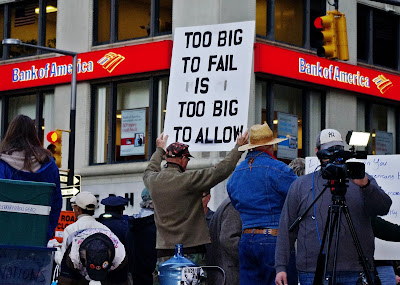AIG Removed from ‘Too-Big-To-Fail’ Status: The Latest Indicator of Cyclicity and Amnesia
Today’s post is a short commentary on the latest development
in a story which we have already covered here in Financial Regulation Matters. In early October we looked at the
Financial Stability Oversight Council (FSOC) and their decision to remove AIG,
the insurance Giant that played a central role in the Financial Crisis, from
its designation
as a ‘Systemically Important Financial Institution’ (SIFI). In the post we
discussed how some of the world’s most influential financial figures, like Carl
Icahn, had been devoting considerable time and effort to seeing this
designation removed and how, ultimately, the decision could be seen as Donald
Trump and his Administration making
good on a number of promises to scale regulation back in the coming years.
On Friday this deregulation picked up pace, but this time on a global level,
and for this post these developments signal a clear marking of a systemic
shifting through the economic cycles – however, this has connotations.
The details of the deregulatory push will not be examined in
any great detail here, because that was done in the previous
post. Yet, there were questions
raised as soon as the US chose to remove the SIFI designation regarding how
global regulators would react, with onlookers suggesting that looking at the size of a firm is not as accurate nor
fair as looking at the particular operations of the said firm. To this end, the
Financial Stability Board (FSB), which serves to coordinate financial
regulation across the G20, has now (supposedly) declared that they will shift
their regulatory focus to activities, rather than size – with the expected
result being that firms like AIG will have their Too-Big-To-Fail (TBTF) status
removed in line with the US’s designations. However, to read the headlines
would have you believe that the FSB has simply chosen the same path as the US
because it makes sense, but a closer inspection reveals that the US Treasury
has been actively lobbying the FSB to
reduce its designation, which seems to add further fuel to the assertion
declared in recent posts (here
and here)
concerning the independence of regulators – should regulators really be
lobbying other regulators for private companies to benefit?
There have been many analyses into the validity
of the TBTF label, and the validity
of applying it to companies which have proven themselves, beyond question,
to having been complicit in one of the largest and most systemic financial
failures on record. There have also been questions
raised by concerned politicians like Senator Elizabeth Warren regarding the
decision in the US to remove AIG’s SIFI designation. Yet, whilst all of these
analyses and concerns are more than valid, there is a much larger, more
systemic, more social issue that needs to be acknowledged: Cyclicity. Whilst
political cycles of liberals or conservatives make the headlines and are
portrayed as being true indicators of social development, it is actually
economic cycles which determine progression; it is widely acknowledged in the
literature that these cycles of growth > bubble > collapse >
regulation > populism > deregulation > growth are what defines
society, with it being suggested
that this model is inherent to what we consider a Government-led society to be.
Also, the obvious comparisons
made between the Great Depression and the Great Recession, and between the political
developments of the 1930s and 2008 onwards, suggest that comparison can be
made because the problem is systemic, not just confined to the machinations of
a given era. Whilst the comparisons may not be directly transferrable between
eras, the sentiment is exactly the same – business exploits the system, then
the system works to develop the same environment again for business to exploit.
This is hard to disagree with, and forms part of the reason why regulation can
never truly be ‘successful’ in preventing financial-based scandals, because
they system is designed to operate in that way; really, all that one can hope
for, is that the public is protected as much as possible. Yet, whilst having
hope is necessary, the reality tells us that the money siphoned off by business
has to be created somewhere, and that is the public’s role. Then, in order to
repair the damage and create a facilitative environment for the next wave, the
resources have to come from somewhere, and that is the public’s role. So, in
reality, regulators would have a hard time explaining what it is they are meant
to do within the public-safety parameter, but arguably they would have no such
problem if asked the same question from within the pro-business realm – the recent
posts on regulator independence provide more than enough evidence for this.
Ultimately, recent events like the elections of the unashamedly
pro-business and anti-public Donald Trump and Theresa May, combined with the concerted and sustained deregulatory campaigns to reduce the oversight of exactly the same entities that brought
the system to its knees only less than a decade ago should be confirmation, if
confirmation is needed, that we are passing through the phases whereby society
has been extorted enough so that preparations can be developed to allow for the
next phase, which is business taking advantage of systemically-created
opportunities. Some may be of the opinion that this is how it should be, and
admittedly there is no alternative proposed here other than greater protection
of the vulnerable in society (which is
achievable), but the overriding concern is that, last time, there was a buffer
of 60+ years for society to prepare itself, this time there is only 10+; it is
contested here that this is simply not enough – we need our own “Quiet
Period”, and we need it much more than the ‘growth’ that is consistently
regurgitated out of the mouths of those associated with the political apparatus’
of Washington, D.C., and London.
Keywords – AIG, Insurance, Politics, Regulation, Financial
Stability Board, G20, Trump, Theresa May, Economics, Cycles, Society, @finregmatters.





Comments
Post a Comment